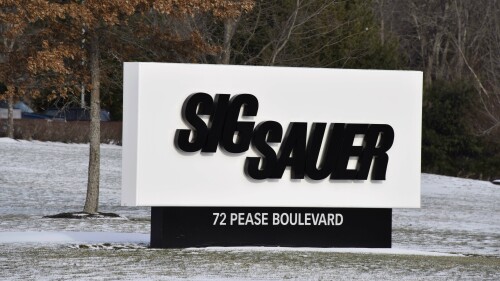By Louis Krauss
Star Tribune
HENNEPIN COUNTY, Minn. — Hennepin County law enforcement leaders on Friday condemned the County Attorney’s Office announcement that it will no longer prosecute most felony cases arising from low-level traffic stops.
County Attorney Mary Moriarty, who revealed the new policy Wednesday, said it will help reduce disproportionate targeting of minorities in stops for minor offenses such as broken taillights or improper turns. The policy takes effect Oct. 15.
| WEBINAR: Active shooter response: The patrol officer’s complete toolkit
Sheriff Dawanna Witt and police chiefs who spoke were critical of not being notified ahead of the announcement. They said the change will “embolden criminals” because charges will not be filed if serious gun or drug possession crimes are discovered during a low-level stop.
In a morning news conference organized by the Hennepin County Chiefs of Police Association, Minnetonka Police Chief Scott Boerboom said the policy doesn’t take into consideration how each of the dozens of different communities and police departments of Hennepin County will be uniquely affected.
“This one-size-fits-all policy will have serious consequences for policing and for public safety across our county,” said Boerboom, who is also president of the county police chiefs association.
Roughly 20 law enforcement leaders and police chiefs joined Boerboom and Witt at the news conference in Minneapolis City Hall to show their disapproval of the policy.
In response, the County Attorney‘s office said in a statement that other jurisdictions across the country have implemented the same policy, which has allowed a greater focus on serious crimes.
“The same objections arise every time, and they are overcome by the policy change being successful every time in shifting law enforcement resources to focus on violent crimes and dangerous driving conduct that take lives,” the statement read.
According to Witt, just less than half of the 377 illegally possessed guns seized by the Sheriff’s Office so far in 2025 were taken during traffic stops.
She said her office has made just over 93,200 stops this year, with 62,600 resulting in verbal warnings without a citation or arrest.
Moriarty, meanwhile, presented data that shows gun and drug charges stemming from traffic stops are rare. In a release, her office said that in all Minneapolis police equipment and moving violations in 2017 and 2018, a gun was recovered less than 0.5% of the time.
When asked about the rationale of the policy helping reduce racial profiling, Witt said she believes the practice exists. But she said agencies must deal with individuals who are responsible for those problems instead of making “blanket rules or policies that limit law enforcement from using the tools that we have to keep our community safe.”
Erik Fadden , the public safety director for the city of Plymouth , said the policy would hinder police in situations such as a recent traffic stop when a driver pulled over for illegal window tinting turned out to be a felon banned from carrying a gun.
Joining Moriarty on Wednesday was Ramsey County Attorney John Choi , who instituted a nearly identical policy change in 2021 and said it was the most criticized decision of his career.
After years of studying the data with law enforcement and the public, he said, it was shown that “public safety was not negatively impacted at all” in Ramsey County.
Minneapolis police did not attend the Friday news conference. A department spokesman said this week that the new policy will not affect the way Minneapolis officers patrol because “much of what was announced” has already been policy since October 2021.
A main criticism on Friday was that law enforcement groups were not consulted earlier.
Boerboom said he was not told of the policy until two minutes before it was announced. Afterward, Boerboom said, he and other chiefs heard concerns from their officers and the public about how it will affect their work.
“We should have been invited to the table and had a conversation about how this affects our communities,” he said.
Moriarty’s office said engaging with law enforcement in advance previously has led to “leaks and coordinated efforts to undermine collaborative work.”
Her office said it purposefully announced the policy a month ahead of the Oct. 15 implementation date so that it can “meaningfully engage with all stakeholders,” including law enforcement and community partners.
Do you believe the county attorney’s move to halt felony prosecutions arising from low-level traffic stops will negatively impact policing in the region?
Police1 readers respond:
- Absolutely. This is paramount to Washington State’s significant pursuit policy restrictions, which were later rescinded. This will also not last more than a year. Let’s hope the voters make a statement at the ballot and vote this DA out of office.
- Yes this change in policy will negatively effect law enforcement efforts.
- Absolutely, it will negatively impact policing!! I personally have stopped a turn signal violation and located/rescued a kidnapped girl and arrested her kidnapper who was wanted for kidnapping her!! I’ve also stopped a tag light violation and located a guy wanted for murder!! This policy is ABSURD AT BEST!!
- Oklahoma City Bomber Timothy McVeigh was stopped for having no tags on his car. During the interaction with the Oklahoma Trooper, the Trooper noticed a concealed gun and placed McVeigh under arrest for the registration violation and the weapons violation. McVeigh, of course, had murdered 168 people and wounded almost 700 more shortly before the traffic stop. His arrest was not conducted by the FBI, ATF or any one of a dozen agencies seeking the bomber, it was done by a trooper doing his job. In my garage, there is a chainsaw. While I don’t use it every day, the fact that I need to trim tree branches every few years means that when the need arises, I have one. That’s the problem with short-sighted decisions such as this, while it might seem prudent or politically astute at the time, once a tool of law enforcement is taken away, it is hard to bring it back.
- So an individual is stopped for a headlight out, his license is run and there are multiple felony hits, extraditable to who knows where, and the cop turns a blind eye, writes a warning and says, “have a nice day!!!!” If there is insanity in the country, it starts in places like this where the law is held in such low esteem and officers are supposed to be hand-holding baby sitters and enforcement is way down the ladder in protecting the citizens they are mandated to serve. The example may be extreme, but so is the lack of thought process on the part of these county attorneys. Usually, they are passing their issues on to someone else, and look at all the money that the county saved.
- Even if only one gun is removed from the street, the criminal needs to be prosecuted. What other serious crimes or injuries could occur by that individual who had no consequences from the serious criminal violation?
- The da is way wrong. The da office is just trying to improve/manipulate their stats to make it look like their county has lessened their crime rate. Crime will instead increase. Crooks will see through this and laugh and take advantage.
- 1. Traffic stops are often gateways to uncovering serious crimes.
- History shows that many dangerous felons — from drug traffickers to fugitives to violent offenders — are caught during what begin as routine stops (broken taillight, expired tag, improper lane change).
If prosecutors refuse to pursue felonies arising from these encounters, offenders will quickly learn that traffic enforcement no longer carries serious consequences.
2. It creates a de facto safe haven for criminals.
Felons who transport drugs, guns, or stolen property often rely on vehicles. • By signaling that contraband or felony conduct discovered during a “minor” stop won’t be prosecuted, the policy effectively lowers the risks of using vehicles for criminal activity.
3. It erodes deterrence and officer morale.
- Deterrence is central to law enforcement. If criminals believe there’s no prosecutorial follow-through, compliance with laws will decline.
Officers, knowing their work will not be backed up in court, will lose incentive to conduct proactive traffic enforcement, reducing visible police presence and further emboldening lawbreakers.
4. It disproportionately harms law-abiding citizens.
- Ordinary residents rely on police to intercept threats before they escalate.
When felons are allowed to slip through because of prosecutorial disinterest, the community absorbs the cost in the form of more guns on the street, impaired drivers staying on the road, and higher rates of violence spilling into neighborhoods.
5. It signals a breakdown in inter-agency cooperation.
- Effective policing requires alignment between police, prosecutors, and courts.
- A categorical refusal to prosecute undermines that partnership and breeds public distrust, making communities feel unprotected and police powerless.
- Terrible policy. If someone is in possession of guns or drugs they should be charged. Often times this seizure of a gun or drugs save lives. It is not political, or racial. it is just good police work keeping communities safe and clean.
- Without a doubt, this will negatively impact policing. If I lived there, I would move. If I was a police officer there, I would transfer somewhere else. Watch violent crime levels spike.
- It will absolutely impact the officers ability to get the guns off the streets. If they want to stop prosecuting the drug offenses, fine. But declining gun charges emboldens criminals and will get people killed. They are critical for officer safety. Distractions can cause things to spin out of control in seconds. Officers have been killed during these encounters. We need a universal law to cover every cop everywhere.
- Of course! Ignoring a felony is ridiculous. Will the traffic infraction be thrown out too? Empowering criminals and degrading the justice system is not a good path.
- So I can murder someone in my car with expired tabs, pulled over for such and won’t be arrested?
Jeff Day of the Minneapolis Star Tribune contributed to this story.
©2025 The Minnesota Star Tribune. Visit startribune.com.
Distributed by Tribune Content Agency, LLC






